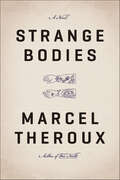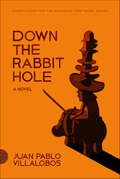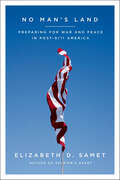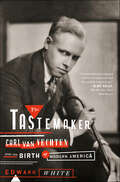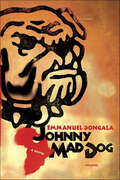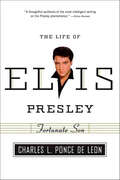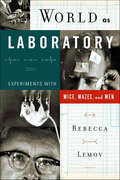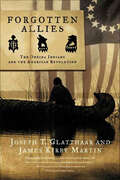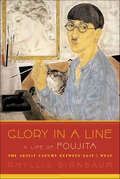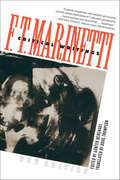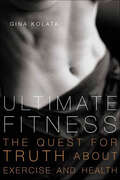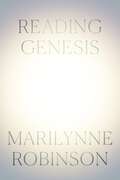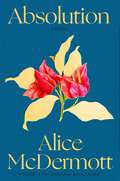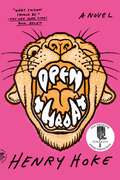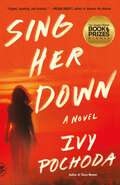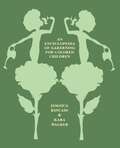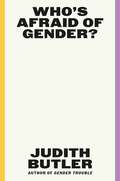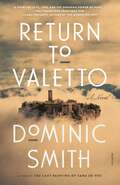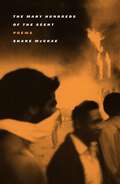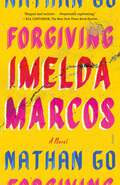- Table View
- List View
Strange Bodies: A Novel
by Marcel TherouxA dizzying novel of deception and metempsychosis by the author of the National Book Award finalist Far NorthWhatever this is, it started when Nicholas Slopen came back from the dead.In a locked ward of a notorious psychiatric hospital sits a man who insists that he is Dr. Nicholas Slopen, failed husband and impoverished Samuel Johnson scholar. Slopen has been dead for months, yet nothing can make this man change his story. What begins as a tale of apparent forgery involving unknown letters by the great Dr. Johnson grows to encompass a conspiracy between a Silicon Valley mogul and his Russian allies to exploit the darkest secret of Soviet technology: the Malevin Procedure. Marcel Theroux's Strange Bodies takes the reader on a dizzying speculative journey that poses questions about identity, authenticity, and what it means to be truly human.
The Fun Stuff: And Other Essays
by James WoodFollowing The Broken Estate, The Irresponsible Self, and How Fiction Works—books that established James Wood as the leading critic of his generation—The Fun Stuff confirms Wood's preeminence, not only as a discerning judge but also as an appreciator of the contemporary novel. In twenty-three passionate, sparkling dispatches—that range over such crucial writers as Thomas Hardy, Leon Tolstoy, Edmund Wilson, and Mikhail Lermontov—Wood offers a panoramic look at the modern novel. He effortlessly connects his encyclopedic, passionate understanding of the literary canon with an equally in-depth analysis of the most important authors writing today, including Cormac McCarthy, Lydia Davis, Aleksandar Hemon, and Michel Houellebecq. Included in The Fun Stuff are the title essay on Keith Moon and the lost joys of drumming—which was a finalist for last year's National Magazine Awards—as well as Wood's essay on George Orwell, which Christopher Hitchens selected for the Best American Essays 2010. The Fun Stuff is indispensable reading for anyone who cares about contemporary literature.
Down the Rabbit Hole: A Novel
by Juan Pablo Villalobos"A brief and majestic debut." —Matías Néspolo, El MundoTochtli lives in a palace. He loves hats, samurai, guillotines, and dictionaries, and what he wants more than anything right now is a new pet for his private zoo: a pygmy hippopotamus from Liberia. But Tochtli is a child whose father is a drug baron on the verge of taking over a powerful cartel, and Tochtli is growing up in a luxury hideout that he shares with hit men, prostitutes, dealers, servants, and the odd corrupt politician or two. Long-listed for The Guardian First Book Award, Down the Rabbit Hole, a masterful and darkly comic first novel, is the chronicle of a delirious journey to grant a child's wish.
No Man's Land: Preparing for War and Peace in Post-9/11 America
by Elizabeth D. SametAs the post-9/11 wars wind down, a literature professor at West Point explores what it means for soldiers, and our country, to be caught between war and peace. In her critically acclaimed, award-winning book Soldier's Heart, Elizabeth D. Samet grappled with the experience of teaching literature at the United States Military Academy at West Point. Now, with No Man's Land, Samet contends that we are entering a new moment: a no man's land between war and peace. Major military deployments are winding down, but soldiers are wrestling with the aftermath of war and the trials of returning home while also facing the prospect of low-intensity conflicts for years to come. Drawing on a range of experiences-from a visit to a ward of wounded combat veterans to correspondence with former cadets, from a conference on Edith Wharton and wartime experience to teaching literature and film to future officers-Samet illuminates an ambiguous passage through no man's land that has left deep but difficult-to-read traces on our national psyche, our culture, our politics, and, most especially, an entire generation of military professionals. In No Man's Land, Elizabeth D. Samet offers a moving, urgent examination of what it means to negotiate the tensions between war and peace, between "over there" and "over here"-between life on the front and life at home. She takes the reader on a vivid tour of this new landscape, marked as much by the scars of war as by the ordinary upheavals of homecoming, to capture the essence of our current historical moment.
The Tastemaker: Carl Van Vechten and the Birth of Modern America
by Edward WhiteA revealing biography of the influential and controversial cultural titan who embodied an eraThe Tastemaker explores the many lives of Carl Van Vechten, the most influential cultural impresario of the early twentieth century: a patron and dealmaker of the Harlem Renaissance, a photographer who captured the era's icons, and a novelist who created some of the Jazz Age's most salacious stories. A close confidant of Langston Hughes, Gertrude Stein, George Gershwin, F. Scott Fitzgerald, and the Knopfs, Van Vechten frolicked in the 1920s Manhattan demimonde, finding himself in Harlem's jazz clubs, Hell's Kitchen's speakeasies, and Greenwich Village's underground gay scene. New York City was a hotbed of vice as well as creativity, and Van Vechten was at the center of it all.Edward White's biography—the first comprehensive biography of Carl Van Vechten in nearly half a century, and the first to fully explore Van Vechten's tangled relationship to race and sexuality—depicts a controversial figure who defined an age. Embodying many of the contradictions of modern America, Van Vechten was a devoted husband with a coterie of boys by his side, a supporter of difficult art who also loved lowbrow entertainment, and a promoter of the Harlem Renaissance whose bestselling novel—and especially its title—infuriated many of the same African-American artists he championed. Van Vechten's defense of what many Americans considered bad taste—modernist literature, African-American culture, and sexual self-expression—created a popular appetite for these quintessential elements of American art. The Tastemaker encompasses its subject's private fears and longings, as well as Manhattan's raucous, taboo-busting social scene of which he was such a central part. It is a remarkable portrait of a man whose brave journeys across boundaries of race, sexuality, and taste helped make America fully modern.
Johnny Mad Dog: A Novel
by Emmanuel DongalaLife During Wartime, As Seen Through the Eyes of Two Congolese Teenagers Set amid the chaos of West Africa's civil wars, Emmanuel Dongala's striking novel tells the story of two teenagers growing up while rival ethnic groups fight for control of their country.At age sixteen, Johnny is a member of the Death Dealers, a rebel faction bent on seizing power. Even as he is drawn into the rebels' program of terror, Johnny Mad Dog, as he calls himself, retains his youthful exuberance--searching for girls, good times, and adventure. Sixteen-year-old Laokolé, for her part, dreams of finishing high school and becoming an engineer, but as rogue militias prepare to sack the city, she is forced to leave home with her mother and brother--and then finds herself alone and running from the likes of Johnny.Acclaimed in France, Johnny Mad Dog is a coming-of-age story like no other; Dongala's masterful use of dual narrators makes the novel an unusually vivid and affecting tale of the struggle to survive--and to retain one's humanity--in terrifying times.
Fortunate Son: The Life of Elvis Presley
by Charles L. Ponce de LeonElvis Presley was celebrity's perfect storm. His sole but substantial contribution was talent, a fact Charles L. Ponce de Leon is careful to demonstrate throughout his wonderfully contextual Fortunate Son. Even as the moments of lucidity necessary to exercise that talent grew rarer and rarer, Elvis proved his musical gifts right up to the end of his life. Beyond that, however, he was fortune's child. Fortunate Son succinctly traces out the larger shifts that repeatedly redefined the cultural landscape during the 1950s, 1960s, and 1970s, using Elvis's life to present a brief history of American popular culture during these tumultuous decades.
World as Laboratory: Experiments with Mice, Mazes, and Men
by Rebecca LemovDeeply researched, World as Laboratory tells a secret history that's not really a secret. The fruits of human engineering are all around us: advertising, polls, focus groups, the ubiquitous habit of "spin" practiced by marketers and politicians. What Rebecca Lemov cleverly traces for the first time is how the absurd, the practical, and the dangerous experiments of the human engineers of the first half of the twentieth century left their laboratories to become our day-to-day reality.
Forgotten Allies: The Oneida Indians and the American Revolution
by Joseph T. Glatthaar James Kirby MartinCombining compelling narrative and grand historical sweep, Forgotten Allies offers a vivid account of the Oneida Indians, forgotten heroes of the American Revolution who risked their homeland, their culture, and their lives to join in a war that gave birth to a new nation at the expense of their own. Revealing for the first time the full sacrifice of the Oneidas in securing independence, Forgotten Allies offers poignant insights about Oneida culture and how it changed and adjusted in the wake of nearly two centuries of contact with European-American colonists. It depicts the resolve of an Indian nation that fought alongside the revolutionaries as their valuable allies, only to be erased from America's collective historical memory. Beautifully written, Forgotten Allies recaptures these lost memories and makes certain that the Oneidas' incredible story is finally told in its entirety, thereby deepening and enriching our understanding of the American experience.
Glory in a Line: A Life of Foujita, the Artist Caught Between East & West
by Phyllis BirnbaumThe first biography in English of the Japanese artist who was a central figure in the dazzling artistic milieu of 1920s ParisWhen we think of expatriates in Paris during the early decades of the twentieth century, certain names come to mind: Hemingway, Picasso, Modigliani—and Foujita, the Japanese artist whose distinctive works, bringing elements of Japanese art to Western oil painting, made him a major cultural figure in 1920s Montparnasse. Foujita was the only Japanese artist to be considered part of the "School of Paris," which also counted among its members such prominent artists as Picasso and Modigliani. Noteworthy, too, was Foujita's personal style, flamboyant even for those flamboyant times. He was best known for his drawings of female nudes and cats, and for his special white color upon which he could draw a masterful line—one that seemed to outline a woman's whole body in a single unbroken stroke. With the advent of the Second World War, Foujita returned to Japan, where he allied himself with the ruling Japanese militarists and painted canvases in support of the war effort. After Japan's defeat, he was scorned for his devotion to the military cause and returned to France, where he remained until his death in 1968. Acclaimed writer and translator Phyllis Birnbaum not only explores Foujita's fascinating, tumultuous life but also assesses the appeal of his paintings, which, in their mixture of Eastern and Western traditions, are memorable for their vibrancy of form and purity of line.
Critical Writings: New Edition
by F. T. MarinettiThe Futurist movement was founded and promoted by Filippo Tommaso Marinetti, beginning in 1909 with the First Futurist Manifesto, in which he inveighed against the complacency of "cultural necrophiliacs" and sought to annihilate the values of the past, writing that "there is no longer any beauty except the struggle. Any work of art that lacks a sense of aggression can never be a masterpiece." In the years that followed, up until his death in 1944, Marinetti, through both his polemical writings and his political activities, sought to transform society in all its aspects. As Günter Berghaus writes in his introduction, "Futurism sought to bridge the gap between art and life and to bring aesthetic innovation into the real world. Life was to be changed through art, and art was to become a form of life."This volume includes more than seventy of Marinetti's most important writings—many of them translated into English for the first time—offering the reader a representative and still startling selection of texts concerned with Futurist art, literature, politics, and philosophy.
Ultimate Fitness: The Quest for Truth about Exercise and Health
by Gina KolataThe bestselling science reporter for The New York Times tells us what works and what doesn't when we work outUltimate Fitness: The Quest for Truth About Exercise and Health is Gina Kolata's compelling journey into the world of American physical fitness over the past thirty years. It is a funny, eye-opening, brow-sweating investigation into the fads, fictions, and science of fitness training.From the early days of jogging, championed by Jim Fixx— who later died of a heart attack—to weight lifting, cycling, aerobics, and Spinning, Kolata questions such popular notions as the "fat-burning zone" and "spot reducing," the effects of food on performance, how much exercise helps build fitness, and the difference between exercise to help the heart and exercise to change the body. She explains the science of physical fitness and the objective evidence behind commonly accepted prescriptions. Along the way she profiles researchers and mavericks who have challenged conventional wisdom, marketed their inventions, and sometimes bucked criticism only to back down from their original claims.Ultimate Fitness spotlights the machines and machinations of the fitness industry, and cuts through the marketing and hype not only to assess what is healthy, but also to understand what our obsession with staying healthy says about American culture today.
Reading Genesis
by Marilynne RobinsonINSTANT NEW YORK TIMES BESTSELLEROne of our greatest novelists and thinkers presents a radiant, thrilling interpretation of the book of Genesis.For generations, the book of Genesis has been treated by scholars as a collection of documents by various hands, expressing different factional interests, with borrowings from other ancient literatures that mark the text as derivative. In other words, academic interpretation of Genesis has centered on the question of its basic coherency, just as fundamentalist interpretation has centered on the question of the appropriateness of reading it as literally true.Both of these approaches preclude an appreciation of its greatness as literature, its rich articulation and exploration of themes that resonate through the whole of Scripture. Marilynne Robinson’s Reading Genesis, which includes the full text of the King James Version of the book, is a powerful consideration of the profound meanings and promise of God’s enduring covenant with humanity. This magisterial book radiates gratitude for the constancy and benevolence of God’s abiding faith in Creation.
Absolution: A Novel
by Alice McDermottAN INSTANT NEW YORK TIMES BESTSELLERNamed a Best Book of the Year by Time, Esquire, Good Housekeeping, Kirkus Reviews, Los Angeles Times, NPR, Oprah Daily, Real Simple, and VogueA riveting account of women’s lives on the margins of the Vietnam War, from the renowned winner of the National Book Award.You have no idea what it was like. For us. The women, I mean. The wives.American women—American wives—have been mostly minor characters in the literature of the Vietnam War, but in Absolution they take center stage. Tricia is a shy newlywed, married to a rising attorney on loan to navy intelligence. Charlene is a practiced corporate spouse and mother of three, a beauty and a bully. In Saigon in 1963, the two women form a wary alliance as they balance the era’s mandate to be “helpmeets” to their ambitious husbands with their own inchoate impulse to “do good” for the people of Vietnam.Sixty years later, Charlene’s daughter, spurred by an encounter with an aging Vietnam vet, reaches out to Tricia. Together, they look back at their time in Saigon, taking wry account of that pivotal year and of Charlene’s altruistic machinations, and discovering how their own lives as women on the periphery—of politics, of history, of war, of their husbands’ convictions—have been shaped and burdened by the same sort of unintended consequences that followed America’s tragic interference in Southeast Asia.A virtuosic new novel from Alice McDermott, one of our most observant, most affecting writers, about folly and grace, obligation, sacrifice, and, finally, the quest for absolution in a broken world.
How to Be: Life Lessons from the Early Greeks
by Adam NicolsonNicolson crafts a geography of the ancient world and a brilliant exploration of our connections to the past.What is the nature of things?What is justice? How can I be myself?How should we treat each other?Before the Greeks, the idea of the world was dominated by god-kings and their priests. Twenty-five hundred years ago, in a succession of small eastern Mediterranean harbor cities, a few heroic men and women decided to cast off mental subservience and apply their own thinking minds to the conundrums of life.These great innovators shaped the beginnings of western philosophy. Through the questioning voyager Odysseus, Homer explored how we might navigate our way through the world. Heraclitus, in Ephesus, was the first to consider the interrelatedness of things. Xenophanes of Colophon was the first champion of civility. On the Aegean island of Lesbos, the early lyric poets Sappho and Alcaeus asked themselves, “How can I be true to myself?” On Samos, Pythagoras imagined an everlasting soul and took his ideas to Italy, where they flowered again in surprising and radical forms.The award-winning writer Adam Nicolson travels with us through this transforming world and asks what light these ancient thinkers can throw on our deepest preconceptions. Enhanced with maps, photographs, and artwork, How to Be is an expedition into early ideas. Nicolson takes us to the dawn of investigative thought and makes the fundamental questions of the ancient philosophers new again. What are the principles of the physical world? How can we be good in it? And why do we continue to ask these questions? It is an enthralling, exhilarating journey.
Open Throat: A Novel
by Henry HokeFinalist for the PEN/Faulkner Award, the Barnes & Noble Discover Prize, and the James Tait Black Prize for Fiction. One of the Washington Post's 50 Notable Works of Fiction in 2023. One of The New York Times' 10 Best California Books of 2023. “Open Throat is what fiction should be.” —The New York Times Book ReviewA lonely, lovable, queer mountain lion narrates this star-making fever dream of a novel.A queer and dangerously hungry mountain lion lives in the drought-devastated land under the Hollywood sign. Lonely and fascinated by humanity’s foibles, the lion spends their days protecting a nearby homeless encampment, observing hikers complain about their trauma, and, in quiet moments, grappling with the complexities of their gender identity, memories of a vicious father, and the indignities of sentience. When a man-made fire engulfs the encampment, the lion is forced from the hills down into the city the hikers call “ellay.” As the lion confronts a carousel of temptations and threats, they take us on a tour that spans the cruel inequalities of Los Angeles and the toll of climate grief. But even when salvation finally seems within reach, they are forced to face down the ultimate question: Do they want to eat a person, or become one?Henry Hoke’s Open Throat is a marvel of storytelling, a universal journey through a wondrous and menacing world recounted by a lovable mountain lion. Feral and vulnerable, profound and playful, Open Throat is a star-making novel that brings the mythic to life.
Sing Her Down: A Novel
by Ivy Pochoda“Urgent, haunting, and fearless.” —Megan Abbott, author of Beware the Woman“Sing Her Down hits like a shotgun blast.” —Dennis Lehane, author of Small MerciesCormac McCarthy meets Killing Eve in this gritty, razor-sharp thriller following two indelible women on a path to certain destructionWith blistering, incisive prose, the award-winning author Ivy Pochoda delivers a fast-paced L.A. crime novel for the ages. Gripping and immersive, Sing Her Down is a spellbinding thriller that, at its core, shows just what an angry woman is capable of.Florence “Florida” Baum is not the hapless innocent she claims to be when she arrives at the Arizona women’s prison—or so her ex-cellmate Diosmary Sandoval keeps insinuating.Dios knows the truth about Florida’s crimes, understands what Florence hides even from herself: that she was never a victim of circumstance, an unlucky bystander misled by a bad man. Dios knows that darkness lives in women too, despite the world’s refusal to see it. And she is determined to open Florida’s eyes and unleash her true self.When an unexpected reprieve gives both women their freedom, Dios’s fixation on Florida turns into a dangerous obsession, and a deadly cat-and-mouse chase ensues from Arizona to the desolate streets of Los Angeles.
An Encyclopedia of Gardening for Colored Children
by Jamaica KincaidA unique collaboration from two of America’s leading artists that explores the fascinating and hidden history of the plant world.In this witty, deeply original book, the renowned novelist Jamaica Kincaid offers an ABC of the plants that define our world and reveals the often brutal history behind them.Kara Walker, one of America’s greatest visual artists, illustrates each entry with provocative, brilliant, enthralling, many-layered watercolors.There has never been a book like An Encyclopedia of Gardening for Colored Children—so inventive, surprising, and telling about what our gardens reveal.
Who's Afraid of Gender?
by Judith ButlerNational Bestseller. Named a Best Book of 2024 (so far) by NPR, Harper's Bazaar, W, and Esquire, and a Most Anticipated Book of 2024 by The New York Times, The Washington Post, Time, Los Angeles Times, ELLE, Cosmopolitan, Kirkus, Literary Hub, Autostraddle, The Millions, Electric Literature, and them. "A profoundly urgent intervention.” —Naomi Klein "A timely must-read for anyone actively invested in re-imagining collective futurity.” —Claudia RankineFrom a global icon, a bold, essential account of how a fear of gender is fueling reactionary politics around the world. Judith Butler, the groundbreaking thinker whose iconic book Gender Trouble redefined how we think about gender and sexuality, confronts the attacks on “gender” that have become central to right-wing movements today. Global networks have formed “anti-gender ideology movements” that are dedicated to circulating a fantasy that gender is a dangerous, perhaps diabolical, threat to families, local cultures, civilization—and even “man” himself. Inflamed by the rhetoric of public figures, this movement has sought to nullify reproductive justice, undermine protections against sexual and gender violence, and strip trans and queer people of their rights to pursue a life without fear of violence.The aim of Who’s Afraid of Gender? is not to offer a new theory of gender but to examine how “gender” has become a phantasm for emerging authoritarian regimes, fascist formations, and transexclusionary feminists. In their vital, courageous new book, Butler illuminates the concrete ways that this phantasm of “gender” collects and displaces anxieties and fears of destruction. Operating in tandem with deceptive accounts of “critical race theory” and xenophobic panics about migration, the anti-gender movement demonizes struggles for equality, fuels aggressive nationalism, and leaves millions of people vulnerable to subjugation.An essential intervention into one of the most fraught issues of our moment, Who’s Afraid of Gender? is a bold call to refuse the alliance with authoritarian movements and to make a broad coalition with all those whose struggle for equality is linked with fighting injustice. Imagining new possibilities for both freedom and solidarity, Butler offers us a hopeful work of social and political analysis that is both timely and timeless—a book whose verve and rigor only they could deliver.
In Tongues: A Novel
by Thomas GrattanNamed a Most Anticipated Book by Time, Bloomberg, and Electric Literature. RuPaul and Eric Cervini's Allstora Book Club Pick for June. "Thomas Grattan is a master of plot—that rare ability—which makes In Tongues a real roller coaster: funny, sad, shocking, and, finally, quite moving." —Andrew Holleran, author of Dancer from the DanceA young gay man upends the lives of a powerful art-world couple in this steamy novel of self-discovery. It’s 2001, and twenty-four-year-old Gordon—handsome, sensitive, and eager for direction—takes a bus from Minnesota to New York City because it’s the only place for a young gay man to go. As he begins to settle into the city’s punishing rhythm, he gets a job walking rich Manhattanites’ dogs. But it isn’t until he stumbles into the West Village brownstone of two of his clients, the powerful gallery owners Phillip and Nicola, that Gordon learns how much the world has hidden from him—and what he’s capable of doing in order to get it for himself. A lush, heart-quickening novel about family and art, sex and class, and the terror of self-discovery, Thomas Grattan’s In Tongues chronicles Gordon’s perilous pursuit of belonging from the Midwest to New York and, later, to Europe and Mexico City. As he floats further into Phillip and Nicola’s exclusive universe, and as lines blur between employee, muse, lover, and mentor, Gordon’s charm, manipulation, and growing ambition begin to escape his own control, in turn threatening to unravel the lives, and lies, of those around him. Anchored by winsome lyricism, glinting intellect, and a main character whose yearnings and mistakes come to feel like our own, In Tongues crackles with fierce longing and pointed emotion, further confirming Grattan as a rare chronicler of young adulthood’s joys and devastations.
Return to Valetto: A Novel
by Dominic SmithWinner of the Texas Institute of Letters Jesse H. Jones Award for FictionA Best Book of the Year: BookPageA Must-Read: The New York Post and The Christian Science Monitor“A story of love, loss, and the enduring power of hope. I was transfixed from page one.” ―Lara Prescott, New York Times bestselling author of The Secrets We KeptFrom the bestselling author of The Last Painting of Sara de Vos, Dominic Smith’s Return to Valetto tells of a nearly abandoned Italian village, the family that stayed, and long-buried secrets from World War II.On a hilltop in Umbria sits Valetto. Once a thriving village that survived centuries of earthquakes and landslides and became a hub of resistance and refuge during World War II, it has since been nearly abandoned, as residents sought better lives elsewhere. Only ten remain, including the widows Serafino—three eccentric sisters and their steely centenarian mother—who live quietly in their medieval villa. Then their nephew and grandson, Hugh, a historian, returns.But someone else has arrived before him, laying claim to the cottage where Hugh spent his childhood summers. The unwelcome guest is the captivating and no-nonsense Elisa Tomassi, who asserts that the family patriarch, Aldo Serafino, a resistance fighter whom her own family harbored, gave the cottage to them in gratitude. But like so many threads of history, this revelation unravels a secret—a betrayal, a disappearance, and an unspeakable act of violence—that has affected Valetto across generations. Who will answer for the crimes of the past?Dominic Smith’s Return to Valetto is a riveting journey into one family’s dark past, a page-turning excavation of the ruins of history, and a probing look at our commitment to justice in a fragile world. It is also a deeply human and transporting testament to the possibility of love and understanding across gaps of all kinds—even time.
The Future Future: A Novel
by Adam ThirlwellShort-listed for the Goldsmiths PrizeFinalist for the Orwell Prize for Political FictionA wild story of female friendship, language, and power, from France to colonial America to the moon, from 1775 to this very moment: a historical novel like no other.It’s the eighteenth century, and Celine is in trouble. Her husband is mostly absent. Her parents are elsewhere. And meanwhile men are inventing stories about her—about her affairs, her sexuality, her orgies and addictions. All these stories are lies, but the public loves them and spreads them like a virus. Celine can only watch as her name becomes a symbol for everything rotten in society. This is a world of decadence and saturation, of lavish parties and private salons, of tulle and satin and sex and violence. It’s also one ruled by men—high on colonial genocide, natural destruction, crimes against women, and, above all, language. To survive, Celine and her friends must band together in search of justice, truth, and beauty. Fantastical, funny, and blindingly bright, Adam Thirlwell’s The Future Future follows one woman on an urgently contemporary quest to clear her name and change the world.
The Many Hundreds of the Scent: Poems
by Shane McCraeA stunning new collection of poetry from Shane McCrae, winner of the Whiting Writers' Award.Shane McCrae, one of the most powerful voices in contemporary poetry, returns with The Many Hundreds of the Scent, an urgent new collection that brims with lyric force. He expands both the poetic and the personal mythologies that he has been constructing over the course of his career. In addition to introducing his readers to “the thin king / who eats the world,” McCrae invites them to bear witness to his tangle of childhood memories. In brutal, sorrowful lines, he recounts being kidnapped by his white supremacist maternal grandparents from his Black father as a boy. “O reader, listener, stay,” McCrae writes. “You are now evidence.”In The Many Hundreds of the Scent, Homeric figures mingle with those who populate the poet’s world. Helen weighs Paris’s spear in her hand and bloodies a raging Achilles; Penelope burns her loom each night; Dido watches Aeneas’s ship burn on the horizon. A strikingly original and engaging poet, McCrae continually surprises—the collection includes a series of poems about the advent of post-rock and Hex, the debut album of the English band Bark Psychosis. With this collection, he has once more crafted an extraordinarily affecting book of poetry. As Kate Kellaway writes in The Guardian, “In McCrae’s hands, poetry is reclamation. It is also transport: writing a way out and through.”
Thank You (Falettinme Be Mice Elf Agin): A Memoir
by Sly StoneNot many memoirs are generational events. But when Sly Stone, one of the few true musical geniuses of the last century, decides to finally tell his life story, it can’t be called anything else.As the front man for the sixties pop-rock-funk band Sly and the Family Stone, a songwriter who created some of the most memorable anthems of the 1960s and 1970s (“Everyday People,” “Family Affair”), and a performer who electrified audiences at Woodstock and elsewhere, Sly Stone’s influence on modern music and culture is indisputable. But as much as people know the music, the man remains a mystery. After a rapid rise to superstardom, Sly spent decades in the grips of addiction.Now he is ready to relate the ups and downs and ins and outs of his amazing life in his memoir, Thank You (Falettinme Be Mice Elf Agin). The book moves from Sly’s early career as a radio DJ and record producer through the dizzying heights of the San Francisco music scene in the late 1960s and into the darker, denser life (and music) of 1970s and 1980s Los Angeles. Set on stages and in mansions, in the company of family and of other celebrities, it’s a story about flawed humanity and flawless artistry. Written with Ben Greenman, who has also worked on memoirs with George Clinton and Brian Wilson, and in collaboration with Arlene Hirschkowitz, Thank You (Falettinme Be Mice Elf Agin) is a vivid, gripping, sometimes terrifying, and ultimately affirming tour through Sly’s life and career. Like Sly, it’s honest and playful, sharp and blunt, emotional and analytical, always moving and never standing still.
Forgiving Imelda Marcos: A Novel
by Nathan GoNathan Go’s taut meditation on forgiveness and regret is told in the indelible voice of a Filipino chauffeur nearing the end of his life.After suffering a serious heart injury, Lito Macaraeg reaches out to his estranged son—a journalist who lives in the United States, far from his father’s Manila nursing home—to promise him a scoop: the story of a secret meeting between Imelda Marcos and Corazon Aquino. Imelda, best known for her excessive shoe collection, was the flamboyant wife of the late Philippine dictator; Corazon was the wife of the opposition politician who was allegedly killed by the Marcoses. An unassuming housewife, Corazon rose up after her husband’s death to lead the massive rallies that eventually toppled the Marcos dictatorship.Lito was Corazon’s personal driver for many years, and her only companion on the journey from Manila to Baguio City to meet Imelda. Throughout the long drive, Lito’s loyalty to his employer is pitted against his own moral uncertainty about her desire to forgive Imelda. But as Lito unspools his tale about two women whose choices shaped their country’s history, his own story, and failings, slowly come to light. He delves into his past: his neglectful father, who joined a Communist guerrilla movement; their life in a mountain encampment headed by a charismatic priest; and Lito’s struggles with poverty and ambition. In the end, it is Lito himself who must contemplate the meaning and possibility of forgiveness.In Forgiving Imelda Marcos, Nathan Go weaves a deeply intimate novel of alternative history that explores power and powerlessness, the nature of guilt, and what we owe to those we love.
